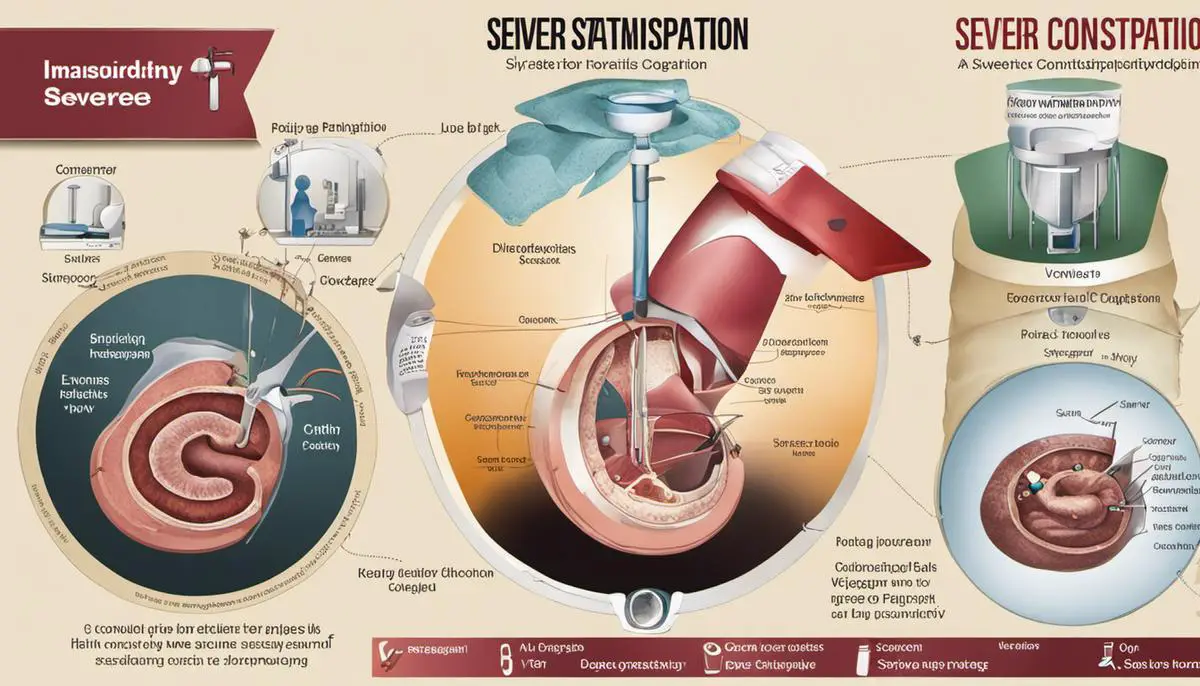Severe constipation, resulting in distressing and debilitating symptoms, stretches beyond the occasional discomfort of straining to pass hardened feces. This malady detrimentally affects quality of life, prompting individuals to seek out various treatment options to alleviate their suffering. Our essay delves into understanding severe constipation, its non-surgical treatments and the situations that may necessitate surgery. We then explore the different types of surgeries, the risks these procedures entail, and the rates of their success. Finally, the focus will shift to the post-surgery period, demonstrating the necessary lifestyle changes and postoperative strategies essential to prevent recurrence of severe constipation.
Understanding Severe Constipation
Understanding Severe Constipation: Defining the Condition
Severe constipation, a common gastrointestinal condition, is a persistent difficulty in evacuating the bowels, often along with irregular and infrequent bowel movements. Occasional constipation is typical, but when the condition becomes chronic and impacts the quality of life, it can be classified as severe.
This condition is usually defined by less than three bowel movements per week. However, frequency varies among individuals; some may have bowel movements every day of the week, while others might have them only once or twice a week. It’s when changes in frequency and consistency last longer than four weeks that it might indicate a problem.
What Causes Severe Constipation?
Several things can contribute to severe constipation. These include a diet low in fiber, insufficient water intake, a lack of physical activity, and delayed bowel movements. Certain medications, including opioids and some antacids, can also cause constipation. Various medical conditions, such as diabetes, hypothyroidism, or neurological disorders, can likewise provoke this issue.
Signs and Symptoms
Symptoms of severe constipation can include passing less than three stools a week, straining during bowel movements, experiencing a sensation of blockage, having hard or lumpy stools, and feeling as though you can’t entirely empty your rectum.
Severe Constipation: When is it a Concern?
Occasional constipation is often not a cause for concern and can be relieved with diet and lifestyle modifications. However, it’s important to seek medical attention for constipation that persists longer than three weeks, is accompanied by blood in the stool, severe abdominal pain, unexplained weight loss, or problems controlling bowel movements.
Addressing Severe Constipation: Surgical Approach
Severe constipation can be addressed through a range of surgeries, with the chosen method reliant on factors such as the root cause of the constipation and the patient’s health. Certain surgeries revolve around the removal of the colon or rectum, or parts thereof, while others focus on making modifications to the digestive tract to promote regular bowel movements.
One typical surgical procedure is a Colectomy, where part or all of the colon is removed. If a specific part of the colon is attributed as the cause, a Segmental resection may be performed. Alternatively, an ileorectal anastomosis could be considered, where the colon is taken out and the small intestine gets attached to the rectum instead.
Another potential surgery is the Malone antegrade continence enema (ACE). Designed mainly for children with chronic, treatment-resistant constipation, this process involves creating a connection between the skin and the colon, enabling liquid to be introduced to clear out the intestines.
However, surgery is typically seen as a last resort for severe constipation, following unsuccessful attempts with other therapies such as lifestyle adjustments or medication. As every surgery comes with its own set of risks and potential complications, it’s imperative to carefully consider these against the possible benefits. Seeking advice from a healthcare professional is crucial in guiding these decisions.

Non-surgical Treatments
Addressing Severe Constipation: Lifestyle Modifications
Changes in lifestyle, such as an increased focus on exercise and dietary modifications, are usually the initial steps in addressing severe constipation. A diet rich in fiber from sources like fruits, vegetables, and whole grains can aid digestion and promote regular bowel movements. Also, staying well-hydrated, mostly through water, can soften the stool and make it easier to pass. Exercise can also stimulate digestion by improving bowel motility.
Despite these healthier lifestyle choices often alleviating many symptoms of severe constipation, they may not always fully resolve the condition. How effective these measures are largely depends on what is causing the individual’s constipation. It’s also worth mentioning that making these lifestyle adjustments can be a significant challenge for some individuals, who may face barriers involving time, access to nutritious foods, or physical ability for exercise.
Over-The-Counter Treatments
There are a multitude of over-the-counter (OTC) products available for constipation relief. These include bulking agents (fiber supplements), stool softeners, lubricants, stimulants, and osmotics. Bulking agents add mass to your stool, making it easier to pass, while stool softeners moisten the stool to allow it to pass more smoothly. Lubricants grease the stool, and stimulants induce muscle contractions in the intestines. Osmotics draw water into the colon from surrounding body tissues to hydrate dry stool.
While these OTC remedies are widely accessible and relatively easy to use, they can also come with drawbacks. Some individuals may experience bloating, gas, or cramping. Overuse of these products can also lead to a dependency, causing constipation to reappear once the product’s use is discontinued.
Prescription Medications
When lifestyle modifications and over-the-counter treatments aren’t enough, doctors may prescribe medications for severe constipation. These include prosecretory drugs that increase fluid secretion in your intestines and gastrointestinal stimulants to coordinate muscle contractions in your intestines.
Although prescription medications can be very effective, they are not without side effects. They may cause symptoms such as nausea, diarrhea, abdominal pain, or even increased heart rate in some cases. Additionally, not all individuals may respond well to these medications and may require a different drug or even surgery.
It’s crucial to remember that, prior to considering surgical options, non-surgical treatment methods for severe constipation should first be thoroughly explored and then exhausted. Despite their own set of potential challenges, these non-surgical approaches offer a less risky and less invasive alternative to surgery.

When is Surgery Required?
Identifying the Need for Surgery in Severe Constipation Cases
Surgery as a treatment option comes into consideration when constipation is severe, chronic, and shows no response to traditional, less aggressive treatment methods. So, what are the indicative signs, symptoms, and diagnostic tests that would suggest the necessity of a surgical intervention?
Recognizing Signs and Symptoms
Signs and symptoms that warrant consideration for surgery typically include persistent, severe constipation that fails to improve with lifestyle modifications and medications. These symptoms might include infrequent bowel movements (fewer than three a week), hard or lumpy stools, straining to have bowel movements, feeling as though there’s a blockage in your rectum that prevents bowel movements, or feeling as though you can’t completely empty the stool from your rectum. Long-term constipation can also result in hemorrhoids, rectal prolapse, or anal fissures which might necessitate surgical intervention.
Medical Tests Indicating Need for Surgery
The decision to opt for surgery isn’t taken lightly, and your healthcare team will likely put you through a series of medical tests to determine the exact cause of your severe constipation and the potential benefit of surgical intervention. These tests could include:
- Colonoscopy or Sigmoidoscopy: These techniques allow for the visualization of the colon and rectum, checking for blockages, polyps or signs of cancer.
- Anorectal Manometry: This test checks the coordination and muscle tone of the muscles that prevent or help in the passing of stool.
- Colonic Transit Studies: These tests involve the swallowing of a capsule containing markers that can be seen on X-rays days later to see if there are abnormal patterns of intestinal muscle function that lead to slow transit time.
- Defecography: This test involves the swallowing of a special contrast material that allows healthcare providers to visualize and assess the efficiency of the rectum during evacuation.
- Pelvic Floor Dysfunction Testing: Through imaging and physical exams, the coordination and function of the pelvic floor muscles can be evaluated.
Surgical Options
When constipation gets so severe that it’s indicative of a diseased, slow, or malfunctioning colon, the common surgical response is to carry out a subtotal or total colectomy. This surgery involves excising some or all of the colon. The leftover piece of the colon or small intestine is then reattached, enabling stool to continue exiting through the anus. It’s important to understand that this surgery carries risk, and is usually a final resort when all other treatment options have not provided the desired relief.
Sometimes, the surgical treatment concentrates on correcting a specific problem that leads to constipation, like rectal prolapse or rectocele. These particular surgeries primarily aim at repairing the structural issue causing constipation, not removing parts of the colon.
The decision to undergo surgery involves careful examination of symptoms, analysis of test results, and detailed discussions between the patient and their medical team regarding potential risks, benefits, and outcomes.

Different Types of Surgeries for Severe Constipation
Types of Surgeries for Severe Constipation
When conventional treatments fail to relieve severe constipation, there are several advanced surgical procedures available. These operations have the potential to greatly enhance the quality of life for individuals suffering from chronic constipation.
Colectomy or Total Colectomy
Colectomy is a surgical procedure performed to remove all or part of the colon. This surgery could either be Partial Colectomy (removal of some parts of the colon) or Total Colectomy (removal of the entire colon). During colectomy, the surgeon reconnects the remaining parts of the digestive system to allow waste to leave the body. The procedure might involve creating a stoma, depending on the areas being removed.
Ileorectal Anastomosis
During this procedure, the colon is removed, and the ileum – or the lower part of the small intestine – is connected directly to the rectum. The function remains the same, but the passage of waste becomes quicker. This procedure is less standardized in comparison to colectomy and is generally done in cases when the rectum is functioning normally.
Rectal Surgery or Rectopexy
This method is employed in the case of rectal prolapse, where rectum walls slide out of place and can even protrude from the anus. Rectopexy involves securing the rectum in the proper position using sutures or sometimes a synthetic mesh.
Potential Risks Associated With Surgeries
Like any surgical procedure, these operations carry potential risk factors such as infection, bleeding, blood clots, and negative reactions to anesthesia. For colectomy specifically, there’s additional risk of developing short bowel syndrome if too much of the colon is removed. In case of Ileorectal anastomosis, potential risks include fecal incontinence and loose and more frequent stools. On the other hand, Rectopexy might come with a risk of nerve damage and recurrence of prolapse, which might need further treatment.
Recovery Process
The recovery period varies depending on the type of surgery and the patient’s overall health. For example, after a colectomy, hospital stay might vary from one week to two weeks depending on the patient’s recovery. In the case of ileorectal anastomosis, individuals start walking almost immediately after surgery, and they can generally go home in two to four days. For rectopexy, recovering could take up to three months depending on the method used.
Success Rate of Surgeries
The success rate also differs depending on the type of surgery. For instance, Total Colectomy and Ileorectal anastomosis have been noticed to show a success rate of 70-80%. Rectopexy, on the other hand, has a success rate ranging from 60% to 90% depending on the procedure. However, successful outcome also depends on following good dietary habits post-surgery and general overall health of the patient.
Determining whether to opt for a surgical approach for managing severe constipation must weigh up the potential benefits and risks. Engaging in a thorough conversation with healthcare providers is critical, ensuring an informed and well-thought-out decision is made.

Post-Surgery Recovery and Lifestyle Changes
Understanding Post-Surgery Recovery: Timeline and Outlook
The recovery period post-surgery for chronic constipation can hinge significantly on factors like the individual’s health and the exact surgical procedure undertaken. In certain cases, a short-term hospital stay may be warranted for monitoring and initial recovery.
Similar to other surgical procedures, discomfort and pain could be present initially, but these can be effectively controlled with appropriate medication. Despite these temporary discomforts, it’s paramount to gradually reintroduce light activity at the doctors’ discretion, as it can aid in quicker recovery and healing.
It’s worth noting that changes in bowel movement frequency or even temporary incontinence can sometimes be observed in patients post-surgery. These changes, though potentially alarming, are usually transitional and ameliorate with time as your body adapts to the surgical modifications.
Potential Complications Post-Surgery
While surgery can greatly improve the symptoms of severe constipation, it’s not without potential complications. These can include anesthetic risks, infection, bleeding, and potential damage to surrounding organs during surgery.
Furthermore, there’s a possibility of postoperative ileus, a temporary slowdown in the bowel movements that usually resolves within a few days. Rarely, some people may develop adherence to nearby tissues or organs as a complication of abdominal surgeries.
Lifestyle Changes to Aid Recovery
Lifestyle changes post-surgery are crucial to aid recovery and prevent recurrence of severe constipation. Dietary changes, such as increasing fiber and fluid intake, are recommended. Fiber, in particular, adds bulk to stools and can help them pass more easily. Fluid intake, particularly water, aids in preventing dehydration, a common cause of constipation.
Regular physical activity is also encouraged as it helps maintain regular bowel movements and overall digestive health. If your job involves a lot of sitting, make sure to take regular short breaks to move around.
Preventing Recurrence of Severe Constipation
Preventing recurrence of severe constipation after surgery involves adhering to the lifestyle changes recommended during recovery. This includes maintaining a high-fiber diet and drinking plenty of fluids. Over-the-counter or prescribed medications may also be required to prevent constipation.
Regular follow-up appointments with your healthcare provider are also crucial to monitor your recovery and address any problems promptly. They can provide guidance tailored to your personal situation and adjust your treatment plan as needed. It’s also essential to promptly report any new or worsening symptoms to your healthcare provider.
Last but not least, managing stress and maintaining a regular routine can also be beneficial. Stress can contribute to digestive issues, including constipation. A regular routine, including consistent meal times and a regular sleep schedule, can help regulate your bowel movements. So, maintaining a balanced and healthy lifestyle is key to preventing the recurrence of severe constipation after surgery.

Ultimately, dealing with severe constipation demands a comprehensive understanding and application of various treatment methods, conservative or surgical. It is crucial to recognize when non-surgical options have been exhausted, and surgical intervention becomes a necessary step towards restoring one’s health. Though surgery carries its own set of risks, it also opens the door to potential relief and improved quality of life. Postoperatively, recovering individuals should prioritize proactive lifestyle changes and preventive measures to keep the specter of constipation at bay. Armed with this knowledge, patients and healthcare providers alike can design a comprehensive, tailored strategy to combat severe constipation, promoting a healthier and happier existence.
